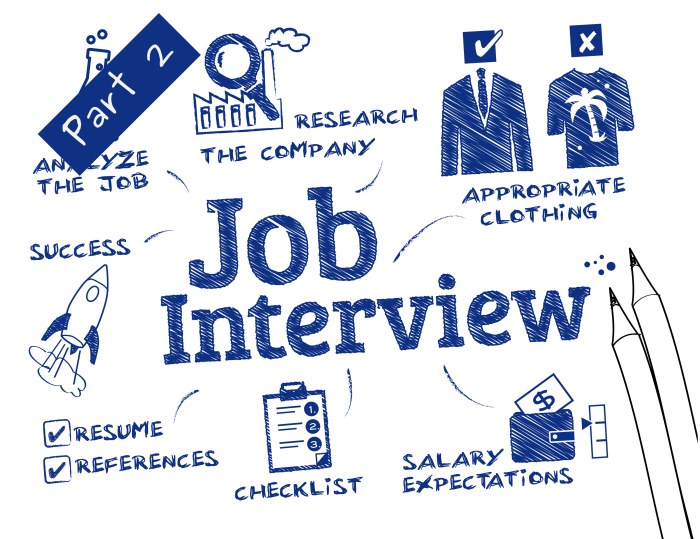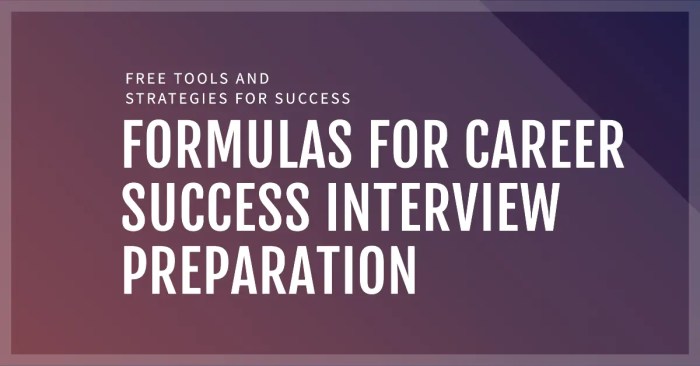In the competitive world of job hunting, formulas for career success interview preparation have emerged as a cornerstone for candidates seeking to stand out and secure their dream roles. This comprehensive guide delves into the essential elements of interview preparation, providing a step-by-step approach to crafting compelling responses, analyzing interview questions, and exuding confidence throughout the interview process.
By understanding the nuances of interview dynamics and employing proven techniques, individuals can transform their interview performance and increase their chances of career success. This guide serves as an invaluable resource for job seekers at all levels, empowering them with the knowledge and strategies to navigate the interview landscape with poise and professionalism.
Career Success Interview Preparation
Interview preparation is paramount for career success. It allows you to showcase your skills and qualifications, research the company and position, and practice answering common interview questions. Thorough preparation enhances your confidence and professionalism, increasing your chances of a successful outcome.
Researching the Company and Position
Before the interview, invest time in researching the company and the specific position you are applying for. This demonstrates your genuine interest and understanding of the role and company culture. Explore the company website, social media pages, and industry news to gather information about their mission, values, products/services, and recent developments.
Familiarize yourself with the job description, noting the key responsibilities and qualifications required.
Practicing Your Answers to Common Interview Questions
Anticipate and prepare for common interview questions to articulate your strengths, skills, and experiences effectively. Practice your answers aloud, considering the STAR method (Situation, Task, Action, Result). This structure provides a clear and concise framework for answering behavioral and situational questions, highlighting your accomplishments and contributions.
Analyzing Interview Questions: Formulas For Career Success Interview Preparation
Types of Interview Questions
Interview questions vary in type and purpose. Behavioral questions explore your past experiences and how you handled specific situations. Situational questions assess your potential behavior in hypothetical scenarios. Technical questions evaluate your specific knowledge and skills related to the position.
Analyzing Questions, Formulas for career success interview preparation
To effectively answer interview questions, it is essential to analyze them carefully. Identify the underlying intent and purpose of the question. Consider what the interviewer is trying to learn about your skills, experience, or thought process. This analysis will guide you in crafting tailored responses that demonstrate your suitability for the role.
Answering Behavioral and Situational Questions
When answering behavioral and situational questions, focus on providing specific examples from your past experiences. Use the STAR method to structure your responses, highlighting the situation, task, actions taken, and the positive outcomes achieved. Quantify your accomplishments whenever possible to provide tangible evidence of your impact.
Crafting Effective Responses

Structuring Your Responses Using the STAR Method
The STAR method is a highly effective technique for structuring your interview responses. It provides a clear and organized framework that allows you to highlight your skills and experiences in a concise and impactful way. By following the STAR format, you can ensure that your answers are well-structured, relevant, and memorable.
Using Storytelling to Make Your Answers More Engaging
Incorporating storytelling into your interview responses can make them more engaging and memorable. Use anecdotes and examples from your past experiences to illustrate your points and demonstrate your skills and abilities. By weaving a compelling narrative, you can capture the interviewer’s attention and leave a lasting impression.
Highlighting Your Skills and Experience
When crafting your interview responses, be sure to highlight your relevant skills and experience. Use specific examples to demonstrate how your abilities align with the requirements of the position. Quantify your accomplishments whenever possible to provide tangible evidence of your impact.
By showcasing your strengths and how they can benefit the company, you can increase your chances of success.
Practicing and Refining
Benefits of Practicing Your Interview Answers
Practicing your interview answers is essential for success. It allows you to refine your responses, build confidence, and anticipate potential questions. By rehearsing your answers aloud, you can identify areas for improvement and ensure that you deliver your message clearly and effectively.
Conducting Mock Interviews
Conducting mock interviews with friends, family, or a career counselor can provide valuable feedback and help you refine your interview skills. Simulate real-life interview scenarios to gain experience answering questions, managing nerves, and presenting yourself professionally.
Refining Your Answers Based on Feedback and Self-Reflection
After practicing and conducting mock interviews, take time to reflect on your performance and seek feedback from others. Identify areas where you can improve your answers, both in terms of content and delivery. Use this feedback to refine your responses and enhance your overall interview technique.
Additional Preparation Techniques

Dressing Professionally and Arriving on Time
First impressions matter in interviews. Dress professionally and arrive on time to demonstrate your respect for the interviewer and the company. Appropriate attire conveys professionalism and attention to detail, while punctuality shows that you value the interviewer’s time.
Managing Nerves and Building Confidence
It is natural to feel nervous before an interview. However, it is important to manage your nerves and project confidence. Practice relaxation techniques such as deep breathing or visualization to calm your nerves. Focus on your preparation and the value you bring to the company to boost your confidence.
Researching the Interviewer and the Company Culture
Researching the interviewer and the company culture can provide valuable insights that can help you tailor your answers and make a positive impression. Learn about the interviewer’s background, interests, and role within the company. Understanding the company culture will help you align your responses with the organization’s values and goals.
Common Interview Mistakes
Common Mistakes Candidates Make in Interviews
There are several common mistakes that candidates make in interviews, which can hinder their chances of success. These include failing to prepare adequately, not dressing professionally, arriving late, being overly nervous, interrupting the interviewer, or providing vague or irrelevant answers.
How to Avoid Mistakes and Demonstrate Professionalism
To avoid these mistakes and demonstrate professionalism, it is important to prepare thoroughly, dress appropriately, arrive on time, maintain composure, listen attentively, and provide well-structured and relevant answers. By avoiding common pitfalls and showcasing your professionalism, you can increase your chances of making a positive impression and securing the position.
Handling Difficult Questions or Unexpected Situations
During an interview, you may encounter difficult questions or unexpected situations. It is important to remain calm and professional in these circumstances. If you do not know the answer to a question, be honest and offer to follow up with the information later.
For unexpected situations, use your judgment and respond appropriately, demonstrating your adaptability and problem-solving skills.
Sample Interview Questions

| Category | Question | Tips |
|---|---|---|
| Behavioral | Tell me about a time you faced a challenge and how you overcame it. | Use the STAR method to highlight your problem-solving skills and resilience. |
| Situational | How would you handle a conflict with a colleague? | Demonstrate your conflict resolution skills and ability to work effectively in a team. |
| Technical | Describe your experience with a specific software or technology. | Provide specific examples of your technical proficiency and how it has benefited your previous roles. |
Interview Preparation Checklist
- Research the company and position thoroughly.
- Practice your answers to common interview questions using the STAR method.
- Conduct mock interviews with friends, family, or a career counselor.
- Dress professionally and arrive on time for the interview.
- Manage your nerves and build confidence through relaxation techniques and self-affirmations.
- Research the interviewer and the company culture to tailor your answers.
- Be prepared to handle difficult questions or unexpected situations professionally.
Clarifying Questions
What are the key elements of effective interview preparation?
Effective interview preparation involves researching the company and position, analyzing interview questions, practicing your answers, and refining your responses based on feedback.
How can I craft compelling responses to interview questions?
Use the STAR method to structure your answers, incorporate storytelling to make them engaging, and highlight your skills and experience concisely and impactfully.
What are some common mistakes to avoid during interviews?
Common mistakes include dressing inappropriately, arriving late, not researching the company, and demonstrating a lack of confidence or professionalism.